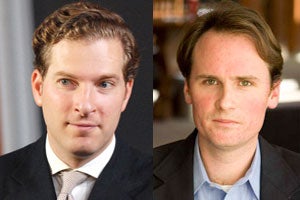In celebration of Constitution Day—the annual celebration of the signing of the U.S. Constitution on Sept. 17, 1787—two HLS professors delivered talks to university audiences about the document upon which the American legal and political systems have been built.
Bemis Professor of International Law Noah Feldman gave a lecture on September 19 titled “The Constitution and the Question of Power” at Harvard. On the same day, Henry N. Ess III Professor of Law John Palfrey spoke at the University of Connecticut about the First Amendment in the Digital Era.
Feldman focused on how the Constitution confers certain powers on the government, and the ways in which it has been interpreted to justify “necessary” government action.
“Our Constitution is a masterpiece of equivocation,” began Feldman. “(And) on no issue does the Constitution equivocate more remarkably than on the question of power.”
The phrase “all legislative powers herein” in Article I, said Feldman, implies there are powers “somewhere outside the text”, which the government does not have. The theory of limited government, he explained, states that the federal government can only do things that are specifically authorized in the Constitution, and anything else belongs to somebody else.
“It raises the question of why we should believe that this particular document is the right document, the authoritative document for deploying power,” said Feldman. “Who died and made the Constitution the Constitution?”
Citing John Locke’s contrarian vision of political society, Feldman said there are certain rights individuals can alienate to the government, but there remain some, namely, life, liberty and property, that are inalienable. However, this theory of limited government with limited powers as authorized by the Constitution is challenged when dealing with its interpretation.
“(There are) things in the real world the government could do, descriptively, but which they have a sinking sensation it was not supposed to do, normatively,” he said. “They are facing a conflict between power as it actually is, and power as it is supposed to be according to these legal documents.”
The cases of McCulloch v. Maryland (1819) and Missouri v. Holland (1920), in which the Supreme Court authorized, respectively, the creation of the Bank of the United States and the signing of a treaty with Canada regarding the protection of migratory birds, were especially significant when considering this tension, because they opened the door for the government to exercise many powers—powers they argued to be necessary—that were lacking in the Constitution.
“Necessity” and “compelling government interests” win, said Feldman, sometimes to the detriment of American society, as in the cases of slavery, the displacement of Indians, and the detention of Japanese-Americans in WWII.
“It’s a point worth remembering on Constitution Day, when we venerate our Constitution, that each and every one of these things was done fully consistently with the Constitution as it was interpreted at the time,” he said.
How, then, Feldman asked, should we understand the gap between how power actually works in the US and how it is supposed to act, normatively, as written in the Constitution?
The cynical approach sees the Constitution as a “parchment promise”, i.e. we have rights until the government sees the need to take them away. The contrary perspective asserts that the Constitution always wins because affirming its authority preserves the rule of law, “which shapes, constraints and drives billions of interactions every day without raising any hard cases.” Lastly, the pragmatic view describes the interaction between real-world power and the Constitution as a constant negotiation. Feldman concluded his talk by admitting that he himself is yet uncertain as to which of these is the best view.
Palfrey argued for the right to free speech on the Internet, in light of recent censorship by some governments around the world to stifle anti-authoritarian protest and resistance. Citing incidents of Internet restriction due to protests in Myanmar and Egypt, he suggested that censorship might have driven even more protestors onto the streets.
“The Internet shutdown in Egypt was more severe due to the country’s high volume of usage,” Palfrey said. “This most likely had adverse effects other than what President Mubarak anticipated.”
Palfrey then related Internet usage by these protestors to the rights laid out by the Constitution, namely those to free speech and against unreasonable seizures, searches and surveillance by the government. Citizen activism, he added, is important in keeping a free and open web.
“Resistance to government controls comes from citizens,” he said, adding, “I don’t think such technology leads to democracies but it can lead to fostering activism.”
